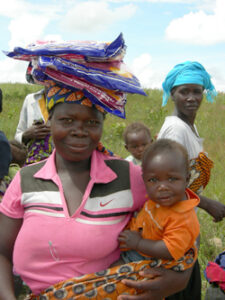With support from ExxonMobil, the President’s Malaria Initiative, and the Global Fund to Fight AIDS, Tuberculosis and Malaria, Population Services International (PSI) works with the National Malaria Control Program to develop communication campaigns based on evidence gathered through research to promote healthier behaviors for malaria control.

A mother carries home ITNs for her family following a net distribution campaign. Source: PSI/Angola
Malaria is one of the largest health concerns in Angola, particularly for pregnant women and young children. Using a long-lasting insecticide-treated net (LLIN) can greatly reduce the risk of malaria. The Ministry of Health is scaling up malaria control activities with expansion of net distribution as well as communication activities for behavior change to encourage the use of a net every night. With support from ExxonMobil, the President’s Malaria Initiative, and the Global Fund to Fight AIDS, Tuberculosis and Malaria, Population Services International (PSI) works with the National Malaria Control Program to develop communication campaigns based on evidence gathered through research to promote healthier behaviors for malaria control.
All communication campaigns are based on in-depth research into behaviors related to malaria control. These results help target communication campaigns to achieve the desired behavior change for malaria prevention and treatment. A recently completed qualitative study supported by Global Fund Round 7 looked at behaviors and beliefs of pregnant women and caregivers of children under the age of 5 years to further understand why mosquito nets are or are not used. In-depth interviews were complemented by a photo narrative of the women’s lives, where study participants took pictures of important factors in their lives that influence their health and the health of their children. Results were analyzed by groups – those who always use a net and those who do not consistently use a net.
One of the role models who always uses a net with her children is Madelena, who is from the province of Malange. The results of her in-depth interviews indicate she knows how malaria is transmitted, understands the health risks of malaria, and always uses an LLIN. She admits a net can get hot at night, but she still insists that her family – and particularly her children – always use a net to prevent malaria.
The results of this study will guide communications campaigns to address mothers’ concerns:”Nets make it hot at night;” “there is not enough space in their house to hang them,” and “they lack knowledge on how to hang a net.” With evidence in hand, PSI is working to change the behavior – and maintain healthy behavior – of mothers in order to have more role models like Madelena.
